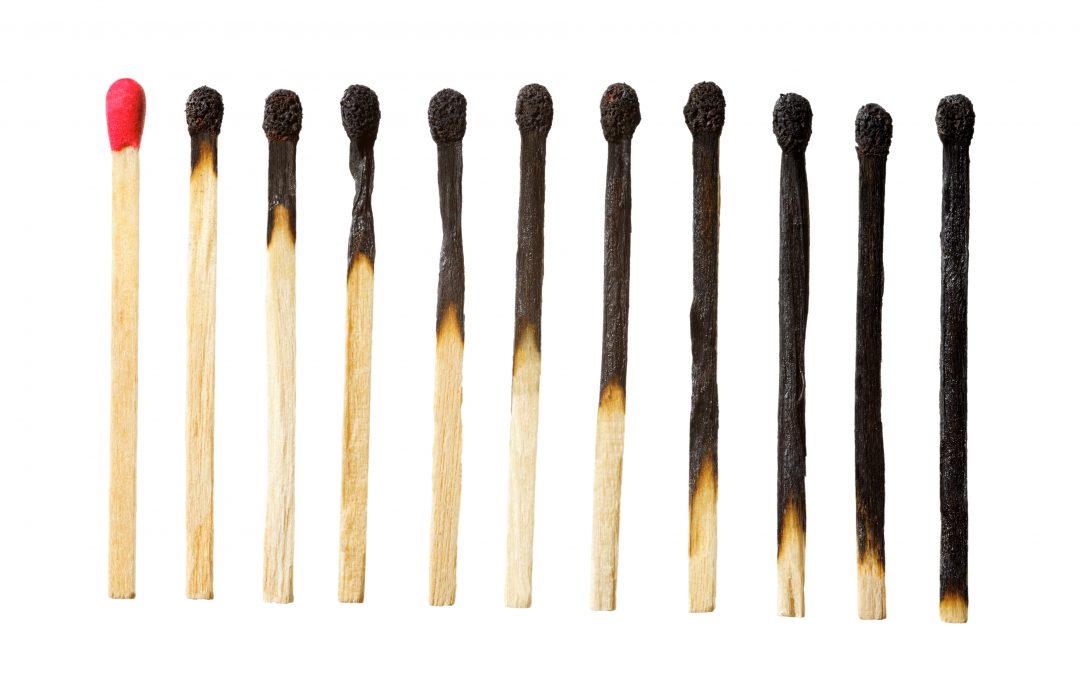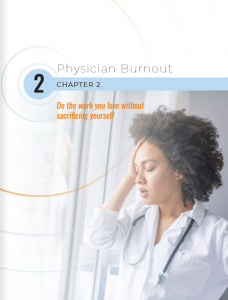Burnout is a term that is used frequently in medical education today, with some studies noting that up to 70% of residents in training meet criteria for the disorder per the Maslach Burnout Inventory (MBI). While that statistic is startling…..what does this actually mean? The answer, as you’ll see below, is not straightforward. Read on to get a glimpse of some of the important information and solutions you’ll find in the chapter on Physician Burnout in the Career and Life Planning Guidebook for Medical Residents.
Defining Burnout:
Per Maslach, Burnout is a “psychological syndrome that develops secondary to work-related stress” and is defined by the symptoms of emotional exhaustion, depersonalization, and a sense of reduced personal accomplishment. While this syndrome can afflict anyone in any occupation, there are specific factors that challenge physicians on a day to day basis and contribute to the epidemic that is Burnout in our profession.
Drivers of Physician Burnout:
Just like there are risk factors for the multitude of diseases you’ve learned in your training, there are factors specific to our profession that place physicians at great risk for developing Burnout. As you will review in our chapter on Physician Burnout, some of these drivers include the following:
• Work Overload
• A Sensation of Loss of Control
• Lacking Rewards, both Financial and Emotional
• Erosion of the Structure of the Medical Community
• Evolution of Medicine as a Business
• Finances: Climbing Educational Debt coupled with Declining Reimbursement
• Personal and Professional Relationships
Again, like most diseases, it’s not “required” to have stressors from each and every one of these forces. Is it possible that roots of your struggle with Burnout are not found in the list above? Of course. Remember, though, that as in medicine, common things occur commonly: knowing the most common factors at the heart of Burnout is crucial to early identification of this disorder in yourself and your colleagues.
Consequences of Physician Burnout
When a family member is sick, the entire family is sick. The same holds true for all of us in the medical profession when one of our own suffers from Burnout. As noted above, there are increasing numbers of your colleagues, both in training and in the “real world” who are mired in their battle with Burnout. As you read this, you may be saying “but I’m OK! I don’t have these issues. Why should this matter to me?” If you are one of the lucky minority who is truly flourishing unaffected by the wave of Burnout that is sweeping our profession, good for you. However, even if you personally are not afflicted with Burnout, it is highly unlikely that your day to day life as a physician is not impacted in some way by the battle to defeat the dark shadow that Burnout has cast over our profession. Have you had to cover call for someone on a regular basis because they are struggling? Wondered about your partners prescribing habits? Become frustrated by a less-than-stellar signout? Felt frustrated for having to recruit yet another new associate for your practice while trying to survive while being short-staffed again? Despite thinking that you aren’t affected by the burden of Burnout, if you nodded your head at least once to one of those questions, then your day to day life really has been pushed or pulled to its limit by Burnout. In addition to the aforementioned challenges, these are some of the very real consequences of Burnout that we face every day as physicians:
Professional Consequences:
• Reduction in quality with an increase in errors
• Increase in malpractice suits
• Increase in physician turnover
• Decrease in patient satisfaction
• Increased friction in the medical team
• Increase in cost of healthcare
Not only are there professional consequences for Burnout, there are personal consequences that are often more insidious and just as alarming as the professional ones we confront daily:
Personal Consequences:
• Breakdown of personal relationships
• Increase in substance misuse
• Increase in mental health disorders: depression and anxiety
• Increase in the “leaky pipeline”: physicians leaving the profession for non-clinical careers
• Increase in physician suicide rate*
*While worrisome for physicians in general, suicide remains at the top of the list of causes of death for residents and interns.
Fighting the Good Fight: Finding Tools for Alleviating Burnout
Now that you’ve had a chance to become acquainted with the signs, symptoms, and consequences of Burnout, the question is…. what can you do about it? While being savvy about how to identify this syndrome, you need to sharpen your skills that will allow you to identify scenarios where Burnout is more likely to flourish. By knowing what to ask of potential employers and getting in touch with what your personal needs to shore up your defenses and replenish your resources, you will be more prepared to keep Burnout at bay and lead a more balancing, fulfilling life as an attending physician. While this list is not exhaustive, here are a few tips and tools to keep in mind as you navigate the often murky water around battling Burnout:
• Be inquisitive and do your homework: ask your potential employer what resources they have to combat burnout and what the rate of utilization actually is amongst physicians
• Know the numbers: look at turnover vs retention rate for physicians in the last 6 months, year, and 5 years
• Know yourself: define what your priorities are and what your deal-breakers are: sometimes it’s not about what you want but it’s what you don’t want that is crucial in making an environment healthy for you
• Know your strengths: get out your toolkit and polish it off; taken an inventory of the skills you have for self-care and don’t be afraid to ask for help if you’re missing a tool that is necessary for your success
You’ve spent years of your life investing in your education and dream of becoming a doctor. Now is the time not only to be proud of the accomplishment and relieved to be near the end of the journey, it’s also the time to enjoy the fruits of your labor and keep joy as a central part of your life as a physician. By being as informed about Burnout as you are of the medicine you studied, you’re taking the first steps in the right direction toward a career that leaves you fulfilled and whole.
To read more on burnout by authors Dr. Shawn C. Jones and Sharee Selah in the Career and Life Planning Guidebook for Medical Residents, follow this link: Physician Burnout – Do the Work You Love without Sacrificing Yourself
Dr. Megan Vermeulen is the Director of Content Strategies at physiciancareerplanning.com and Associate Program Director at Rowan University SOM Family Medicine Residency Program.
_ _ _ _ _ _ _ _
_ _ _ _ _ _ _ _




